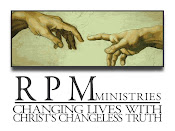The BCC Author Interview Q & A with Marie Notcheva
Read original post on the Biblical Counseling Coalition's website here
As part of our BCC vision, we want to help you to get to know gifted Christian authors and their books. This week we’re highlighting Marie Notcheva as she talks about her book Redeemed from the Pit.
BCC: “There are many books available about eating disorders, which impact up to 15% of American women. What sets your book, Redeemed from the Pit, apart?”
MN: “When I began looking at Christian books that discuss anorexia and bulimia, I noticed that most of them either fell into the ‘self-help’ or ‘pop-psychology’ genre. I saw a lot of talk about self-esteem and loving ourselves more, but very little Scripture. In order to be transformed from the destructive thinking that leads to eating disorders, it’s important to see anorexia and bulimia as life dominating sins. My book focuses on the importance of renewing one’s mind with the Word of God, while actively ‘putting off’ sinful eating patterns and ‘putting on’ God-honoring behavior.”
BCC: “What is your perspective on how to ‘classify’ eating disorders?”
MN: “Anorexia and bulimia are learned behaviors—which, by God’s grace, can be unlearned. God offers forgiveness and cleansing from ‘addictions.’ This is GOOD news! God’s Word has already given us the answer: faith and repentance. Some of the harshest criticism I have received for calling them ‘sins’ has actually come from Christians. If we are in Christ, we do have the power by His Spirit to turn around and overcome any self-destructive behavior enslaving us. Helping people realize this is one of the most loving things we can do. Popular wisdom claims that someone with an eating disorder will ‘never be recovered; but always in recovery.’ Where’s the hope in that? Compare that with 1 Corinthians 6, which says the believer can leave behind their old way of life and be totally transformed.”
BCC: “Where does the title of your book, Redeemed from the Pit, come from?”
MN: “It is a reference to Psalm 40. David was stuck in a slimy, muddy pit of sin, and called out to the Lord to rescue him. God responded, and set his feet on a solid rock. That image stuck with me when God granted me repentance from eating disorders—He heard my cry, and patiently walked me out of the ‘pit.’”
BCC: “So, you personally struggled with an eating disorder. Is the book autobiographical?”
MN: “I battled both anorexia and bulimia from age 15 to 32. Chapters 1 and 14 include my testimony, but the book is not an autobiography. My purpose in writing it was to point other women towards the Great Physician, and share with them the same lessons God had taught me. Those were the hardest chapters to write, because an eating disorder is something so deeply personal. It was much easier to write about the theology of repentance, and how to ‘take every thought captive’ than about my own personal struggle.”
BCC: “What would you say are some of the things that cause a young woman to slide into an eating disorder? Where do anorexia and bulimia come from?”
MN: “Of course, everything starts in the mind—unbiblical thinking becomes a meditation, which ultimately determines how one behaves. Some of the underlying sins include fear of man; vanity; idolatry; seeking control of others; lack of self-control (gluttony); perfectionism, and prayerlessness. I unpack each of these throughout the book and counter them with the biblical alternative—the ‘put on.’ Of course, there are also external factors, such as media, parental pressure and the food-obsessed culture in which we live, but the main culprit is our own sin nature. It all goes back to pride and wanting to live independently of God.”
BCC: “Martha Peace wrote the foreword to Redeemed from the Pit. In what ways was Martha of assistance to you in your writing?”
MN: “Martha was very helpful. She went over each chapter with a fine-toothed comb, making sure that my language was unambiguously clear and biblical. For example, she suggested I avoid using the term “delivered” because it might suggest to some readers the exorcism ‘deliverance ministries.’ She also helped me clarify to the reader the importance of our ‘position in Christ’ to our sanctification, versus our ‘identity in Christ’ model. I think I re-wrote that chapter at least four times! Martha also brings decades of experience from the counseling room to her perspective, and that was extremely valuable.”
BCC: “You discuss the role of the local church in your book. Do you feel it is appropriate for someone who suffers from an eating disorder to seek help from her pastor?”
MN: “I absolutely think it is appropriate! Rather than looking outside of the church for a faith-based inpatient facility, a believer may be best helped at home by receiving the counseling and accountability she needs by someone who knows and cares about her. Of course, ideally a pastor would be able to provide another woman in the congregation to disciple the woman seeking help, and she should always be monitored by a doctor. But the biblical model of providing hope, help, and spiritual care for the hurting has always been through the local church. An eating disorder, at its root, is a spiritual battle. While medical care is indeed necessary, true hope and lasting change comes from knowing God’s Word and being able to correctly apply it through a right relationship with Him. This is where the church can come alongside someone struggling, and help her live her life to glorify God.”
BCC: “Thank you, Marie, for introducing our readers to
Redeemed from the Pit.”
BCC Staff
Read More about BCC Staff →















